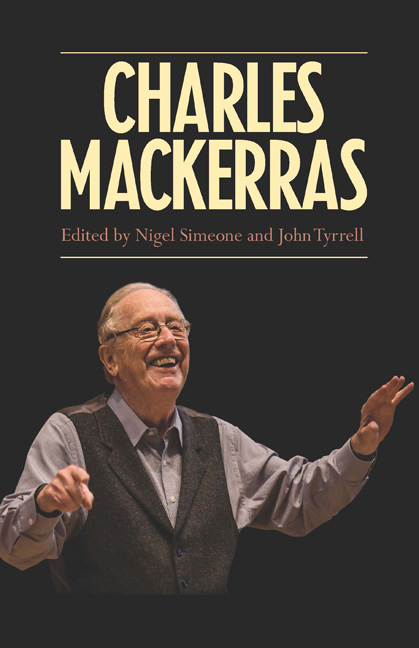Book contents
- Frontmatter
- Dedication
- Contents
- List of Illustrations
- List of Abbreviations
- Preface and Acknowledgments
- About the Contributors
- Charles Mackerras: A Chronology
- Prologue: A Eulogy for Charles
- 1 An Immense Stylist Evolves: 1947–87
- 2 A Personal Portrait of Charles Mackerras
- 3 Mackerras and Janáček
- 4 Goat's Milk in Vienna: Three Memorable Meetings
- 5 The Lion: Charles Mackerras
- 6 ‘The Musical Values of Opera’: WNO, 1987–92
- 7 Triumphs and Tribulations: Opera, 1993–2001
- 8 Rethinking Old Favourites: Opera, 2002–10
- 9 The Last Great ‘Czech’ Conductor
- 10 Reminiscences of a Friend and Colleague
- 11 Reconstructing a Better Version of The Greek Passion
- 12 Reconstructing Sullivan's Cello Concerto
- 13 Three Orchestras
- 14 Coda
- Appendix 1 Mackerras in Performance
- Appendix 2 Desert Island Lists
- Discography
- Bibliography
- Editions and Arrangements by Charles Mackerras
- Index
8 - Rethinking Old Favourites: Opera, 2002–10
Published online by Cambridge University Press: 05 May 2015
- Frontmatter
- Dedication
- Contents
- List of Illustrations
- List of Abbreviations
- Preface and Acknowledgments
- About the Contributors
- Charles Mackerras: A Chronology
- Prologue: A Eulogy for Charles
- 1 An Immense Stylist Evolves: 1947–87
- 2 A Personal Portrait of Charles Mackerras
- 3 Mackerras and Janáček
- 4 Goat's Milk in Vienna: Three Memorable Meetings
- 5 The Lion: Charles Mackerras
- 6 ‘The Musical Values of Opera’: WNO, 1987–92
- 7 Triumphs and Tribulations: Opera, 1993–2001
- 8 Rethinking Old Favourites: Opera, 2002–10
- 9 The Last Great ‘Czech’ Conductor
- 10 Reminiscences of a Friend and Colleague
- 11 Reconstructing a Better Version of The Greek Passion
- 12 Reconstructing Sullivan's Cello Concerto
- 13 Three Orchestras
- 14 Coda
- Appendix 1 Mackerras in Performance
- Appendix 2 Desert Island Lists
- Discography
- Bibliography
- Editions and Arrangements by Charles Mackerras
- Index
Summary
What's very interesting about Charlie is that there were two sides to his conducting. On the one hand, the philological side: his interest in authentic practices, the deep knowledge that he had of Handel and Mozart, and the specialised Janáček repertoire. But on the other hand, when you look at his entire repertoire, he conducted everything – from Serse to Cavalleria to Lucia to the Ring to From House of the Dead to Katerina Ismailova, and so on. This curiosity about different styles and about different types of theatre was always there. When he was a music director, he had the choice: he could conduct Tristan if he wanted to. But there was always something of the old-time greasepaint-considering musician that reminds me of a kind of Viennese Jewish Musikant – one of those guys who could do it all, do it right on the spot and put it all together; he was completely practical like that. So on the one hand he was living in an ivory tower of deep thought, contemplating how to make things sound, and on the other he was a real practising theatre musician. And I think the way he managed to mix all that was just fantastic.
This dramatic instinct applied to all sorts of music. I listened recently to him doing Mozart's ‘Haffner’ Symphony – and I happened to listen to a couple of other people doing it too, and his was by far the most theatrical. The problem is that the word ‘theatrical’ in some circles tends to be thought of as a put-down, but that's wrong, and it's especially wrong in Mozart. I'll never forget watching Charlie doing Zauberflöte here at Covent Garden with the orchestra. It was a sitzprobe and the music was just popping up out of the pit – I was sitting right behind him – and he was having a ball.
- Type
- Chapter
- Information
- Charles Mackerras , pp. 126 - 148Publisher: Boydell & BrewerPrint publication year: 2015



